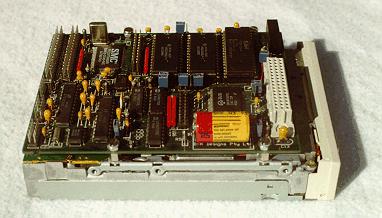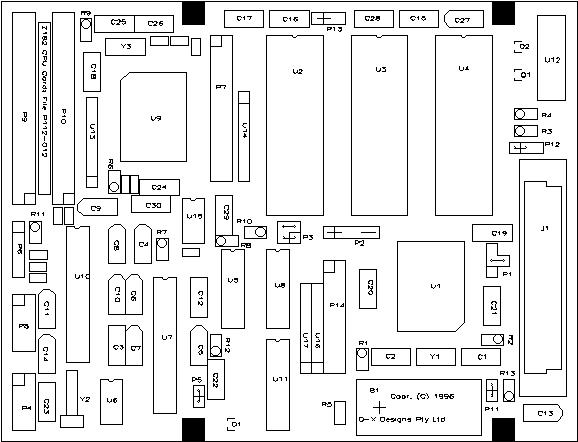The P112 CPU Board

What is it?
The P112 is a stand-alone 8-bit CPU board. Typically running CP/M (tm) or a similar operating system,
it provides a Z80182 (Z-80 upgrade) CPU with up to 1MB of memory, serial,
parallel and diskette IO, and realtime clock, in a 3.5-inch drive form factor.
Powered solely from 5V, it draws 150mA (nominal: not including disk drives) with a 16MHz CPU clock.
Clock speeds up to 24.576MHz are possible.
Download Section

Features
- Dimensions: 130 x 100mm (5.1 x 3.9 inch)
- Support for 5.25 and 3.5 inch diskette drives (up to 4 drives, mixed types)
- Z80182 CPU at 16MHz (12.228, 18.432 or 24.576MHz optional)
- 32kB flash ROM, in-board reprogrammable
- 64kB SRAM, upgradeable to 1MB
- Real-time clock/RAM, with on-board battery
- 5 (yes, five) serial IO ports, 2 as PC-AT compatible connectors, 3 as TTL outputs
- Parallel port, IBM compatible, with bidirectional ability
- Bus expansion/logic analyser socket
- Software included:
Shareware DOS+ and CCP+ (replace CP/M)
Shareware PPIP (replaces PIP)
Shareware UUENCODE & UUDECODE
BIOS support for diskettes, parallel & RS232 serial ports
ROM monitor, including debugger
Utilities:
- ASCII file-transfer (eg UUENCODEd)
- Disk format
- In-system flash-ROM reprogrammer
- Real-time clock sample code
- All source files
- All code (except the shareware items noted above) is offered under the
GNU General Public License.
The board is designed with a maximum of through-hole parts, to facilitate home assembly.
As the CPU and IO chip are only available in 100-pin QFPs (and are not readily available in one-offs),
we offer the board with these items (and 3 other small SMDs) pre-assembled. You can obtain the other parts
locally, and assemble them yourself. Alternatively, we offer the board fully built up & tested.
Both options include a pre-programmed flash ROM, plus a 3.5 inch bootable disk with the above-mentioned software.
P112 was designed in 1996, and sales have now dwindled to virtually nothing. Consequently, I have
reluctantly decided not to accept further orders for this product. I thank previous customers for their support.
This page will remain up for information, and the download files will still be available.
Now supplied by Dave Griffith
Parts List (for home builders)
22pF ceramic 4 C1 C2 C25 C26
120pF ceramic 1 C12
100nF bypass 14 C3 C15 C16 C17 C18
C19 C20 C21 C22 C23
C24 C28 C29 C30
1uF, 16V tant. 9 C4 C5 C6 C7 C8
C9 C10 C11 C27
22uF, 10V tant. 2 C13 C14
7x220 respack 1 U13
7x2k2 respack 1 U14
7x47k respack 2 U16 U17
4k7 resistor 1 R11
10k resistor 3 R5 R7 R10
27k resistor 1 R9
47k resistor 8 R1 R2 R3 R4 R6
R8 R12 R13
2-pin Hdr 2 P5 P11
3-pin Hdr 3 P1 P12 P13
5-pin Hdr 2 P2 P6
2x2-pin Hdr 1 P3
2x5-pin Hdr 2 P4 P8
2x10-pin Hdr 1 P14
2x13-pin Hdr 1 P7
2x17-pin Hdr 2 P9 P10
PCB jumper 10
DIN48 skt. 1 J1 (3x16-way half-DIN skt)
32DIP skt. 3 U2 U3 U4
32kHz crystal 1 Y2 (RTC crystal)
16MHz crystal 1 Y1 Parallel resonant (CPU clock)
24MHz crystal 1 Y3 Parallel resonant (IO chip clock)
*BAR43C diode 1 D1 (Schottky)
*BAR43 diode 1 D2 (Schottky)
*BCW71 transistor 1 Q1
28F256A 1 U4 (Intel Flash ROM, programmed)
74HCT00 1 U5
74ACT02 1 U8
74ACT139 1 U11
62256 2 U2 U3 (Static RAM, 32kB)
DS1202 1 U6 (Dallas RTC chip)
*FDC37C665IR 1 U9 (SMC Super-IO chip)
LT1133 2 U7 U10 (Linear Technology RS232 Tx/Rx)
NMF0512S 1 U12 (Newport Components Flash ROM power)
TL7705ACP 1 U15 (Texas Insts. Reset genr.)
*Z8018216 1 U1 (Zilog CPU chip)
3.7V battery 1 B1 (Lithium Thionyl Chloride, 1/2AA)
Parts prefixed * are pre-installed on the board.
Notes
- You can use the fast SRAM chips out of PC motherboard caches in this board.
Just spread the pins and solder them on to a 32-DIP header. Then plug in the board.
- Be sure to use fundamental mode crystals, not overtone types. Overtones will run at
the wrong frequency, and will cause 'Non-standard CPU clock crystal...' messages on start-up. Note that
the CPU crystal will always "get the blame" in this message, regardless of which crystal is actually wrong.
- In very rare cases, some 24MHz (IO chip) crystals have proved reluctant to start. This can be overcome by
putting a high-value resistor (say 5 - 10M) across the crystal.
- Likewise, check you have the right type of resistor networks. There are 2 types in those 8-pin SIL packs:
7 resistors with a common pin, and 4 independent resistors. P112 uses the 7 commoned resistors.
- There are two kinds of "lithium" battery available: 3.0V Lithium Manganese, and 3.6/3.7V
Lithium Thionyl Chloride. They have the same PCB footprint, but the opposite polarity (ugh!).
The P112 board uses the Lithium Thionyl Chloride types.
The Fine Print
If you have purchased this board fully assembled, D-X Designs Pty Ltd warrants it in respect of faulty components or workmanship,
for a period of ninety days from purchase, providing it has not been subject to damage or abuse. Defective boards must be returned,
freight prepaid, to our Australian address. We will (at our option) repair or replace such boards, and return them to you.
If you have purchased a part-assembled board, we cannot guarantee performance, since the conditions of handling and assembly of parts
are beyond our control.
To the extent permitted by applicable laws, this warranty excludes all others express or implied, and defines our complete liability.
This warranty, and the associated contract of purchase, shall be governed by the laws of the State of Western Australia.
This board, and its accompanying software, are not designed or intended for use in safety-critical or life-support applications.
No liability of any kind is accepted for such use. See also the file LICENSE.TXT on the accompanying diskette, with respect to
software (this file is the text of the GNU General Public License).
This board is not a complete electronic system, but a component thereof. As such, it does not include shielding measures to
limit spurious electromagnetic emissions. It is the responsibility of the person constructing a complete apparatus, to take
such precautions as may be necessary to comply with relevant regulations regarding such emissions.
Software Updates
Top of this page
New software releases for the P112 board will be downloadable from here.....
All software is offered under the GNU General Public License
Note: Updates of my ROM code have been removed. All updates to date (March 1997) are now incorporated in the
main ROM-code archive (see the Download Section)
Ready-to-use Binaries
If you have built a P112 from a bare board, this is what you need to get it up & running.
To burn a system ROM, use either of the ROM files 1996 version or
1997 version. The later one has a few extra bugfixes, but the earlier is more widely used. Your choice. You will need access to a ROM programmer for this.
To make a boot disk, download the disk image and a copy of
rawrite. "rawrite" is taken from the Red Hat Linux 6.2 distribution. Format a 1.44MB floppy with MS-DOS, use rawrite to copy the disk image to it, and you're ready to go.
Note:
A problem has been reported in using these SMC I/O chips with Windows: the FIFO buffers can malfunction.
It is not known whether this will affect the P112 board: but developers of high-speed communications software should be aware of it.
See (Both these links appear broken - 2004):
 Back to Home Page
Back to Home Page


 Back to Home Page
Back to Home Page